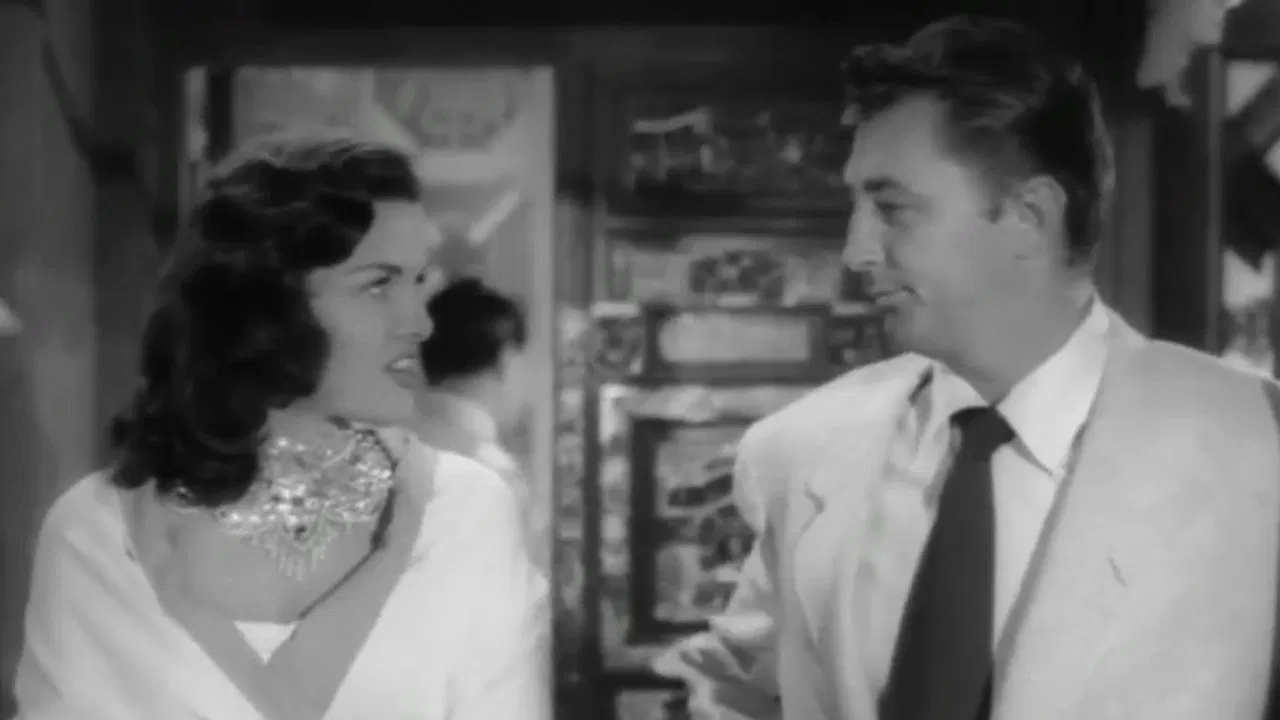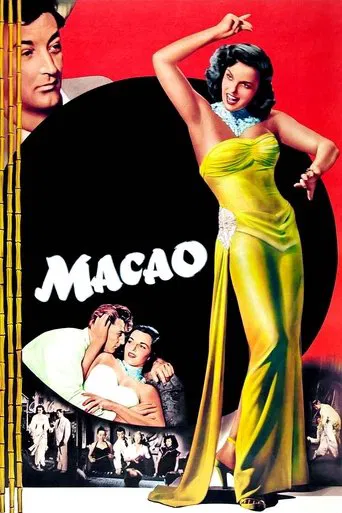

Following the success of "The Big Steal" and "His Kind of Woman", RKO decided to make a very, very similar sort of film with many of the same actors--hoping to once again hit it big in the box office. Robert Mitchum starred in all these films and they took his co-stars from these films (William Bendix and Jane Russell) and tossed in the same sort of story. Because of this, it's pretty easy to mix this film up with the others--I know I did after seeing all three. Now this is NOT to say that "Macao" is a bad film--it's just a case where there wasn't a whole lot that was terribly original. Once again, Mitchum is in a foreign land and has a vague and possibly shady past and once again he's dealing with underworld figures.The film begins with the three stars about to arrive in the Portuguese colony of Macao. Oddly, however, no one seems the least bit Portuguese! Anyway, Russell lifts Mitchum's wallet--making it hard for him to gain admittance to the city or afford to stay there. So, eventually Mitchum and Russell hook up with a mobster (Brad Dexter) and you never know at the time whether Mitchum is a crook, a wannabe crook, a cop or just some noble guy. And, like the previous films, by the end, Mitchum gets the girl, defeats evil and lives happily ever after...just like his other films.Good acting but a retread from start to finish. It's well worth watching but just doesn't meet the standards of the other films.
... View MoreThis is one confusing dull piece of Noir. It's a shame too because it's got Mitchum, Russell, and Bendix, all 3 have had much better moments in a Noir atmosphere. The best part about this? It's short. There is no action, very little gun play, a couple of knife's thrown in the back scenes that instantly kill but barely get stuck in, no blood, no Chinese torture, nothing! I've come to the conclusion that most American classic movies (before 1960) made in the "Orient" suck. The only ones that come to my mind as good are "Mask Of Fu Manchu", "Soldier Of Fortune", "Lost Horizon", and "The Good Earth". I'm sure there are others but mainly if it says it's an Oriental location it's there because the stories very weak and they need an exotic location to take your mind off of the story. I barely remember a scene with Mitchum and Russel getting it on so the steamy angle is a bust, and the story itself is ludicrous. Watch it because your curious as it has Russell and Mitchum, but you will not be impressed at all, bottom line. 5 of 10 and that's being very generous. I will say though in it's defense, that I will use the line on my wife someday that "Diamonds cheapen you".
... View MoreIt seems odd for a film noir to be set on a small peninsula off the coast of China, but 'Macao (1952)' nonetheless fits the bill, in a similar vein to Howard Hawks' 'To Have and Have Not (1944).' Robert Mitchum wanders in off a ferry, looking as weary as always, and is immediately suspected by the city's resident American crime boss (Brad Dexter) to be a dangerous detective from the States. Cochran, actually a vagrant fugitive traversing the globe, accepts these accusations without batting an eyelid, thus joining the ranks of film noir "innocents" who find themselves unwittingly entangled in a messy affair in which they have no rightful business. Meanwhile, Jane Russell, with a spiteful glare that suggests utter contempt for anything that moves, works hard to avoid falling for Cochran; but on whom the sultry singer will ultimately bestow her affection is never in doubt. This film was made purely to bring together its two big stars again, but fortunately it also works as a exotic adventure thriller.According to the opening credits, 'Macao' was directed by Josef von Sternberg. In actuality, producer Howard Hughes dismissed Sternberg before production wrapped up, and so the film was completed by an uncredited Nicholas Ray. Audiences have always loved to see their favourite stars dispatched to exotic locations however short distance they were required to travel from the studio back-lot and the obscure Asian peninsula of Macao adds a spark of Oriental charm to an already-outlandish locale. This is a city where dangerous criminals take sanctuary and open seedy gambling joints, where mysterious Asian henchmen kill their victims with knives rather than guns. Normal societal formalities hold no sway here: Mitchum gets a luscious kiss out of his leading lady within a minute of their meeting, and, incidentally, she gets his wallet. That the screenplay is completely predictable becomes irrelevant next to the strong characterisations and seedy, mysterious atmosphere. This being my first Sternberg film, I'm unsure of his particular directing style, but the dark foot-chases along the sleazy Macao docks struck me as being characteristic of Nicholas Ray's work.Though Mitchum and Russell carry the film pretty well and, indeed, are the only reason for the film's existence an unfortunately-underused supporting cast also does a good job. William Bendix, playing a likable character for once, is a friendly travelling salesman to whom there may be more than meets the eye. Brad Dexter is serviceable as the primary villain, but he's not particularly sinister or intimidating, and his spur-of-the-moment decision to leave the Three-Mile Limit, especially after learning of a plot to capture him, seems utterly contrived. Gloria Grahame (Ray's then-wife, though not for much longer) has a disappointingly-brief role as the villain's shunted lover; early in the film, she and Russell exchange glares than communicate pure mutual contempt. Overall, despite an all-too-familiar storyline, the Oriental-flavoured setting and enjoyable performances make for a film with a fair amount of suspense and intrigue, with just enough laconic humour to keep the story moving along nicely {Mitchum himself reportedly wrote a few scenes to bridge the otherwise-muddled screenplay}. If this one ever comes up on the TV schedule, it's worth a gander.
... View MoreI'm still waiting to discover a good movie in which Jane Russell starred. I haven't seen one yet. If you know of one, let me know. Best as I can tell, Howard Hughes tried to make her a star for two reasons: her breasts. It couldn't have been for her acting ability or that her presence would enhance a quality film. Those just didn't happen. Her films were a bust (pun intended.)You would think it would be almost impossible to shoot a boring film that also included Robert Mitchum, William Bendix, Thomas Gomez and Gloria Grahame....but here it is! The screen time of Bendix and Grahame are woefully small, otherwise this might have been more interesting. The other (lead) characters in this movie are simply not people you care about.The fault of this movie, in addition to unlikeable lead characters, is that it simply isn't entertaining. It's dull, folks, almost as drab as it gets. What a shame. It sure didn't have to be with that cast. Mitchum and Bendix were fun to watch in "The Big Steal," but the only steal in this film is your money to buy or rent this movie. I love film noir, and I liked the exotic setting in here, but this story is so bad I hate to even classify it in that genre (noir). Director Josef Von Sternberg was at the end of his career....and it shows. In fact, he didn't finish this movie. They had to call in Nicholas Ray to do that. This film, in a way, was a poor man's "Morocco," I say "poor man" because Jane Russell was no Marlene Dietrich and "Macao" is no "Morocco."The only saving grace is that the running time is short. You only have to suffer for 81 minutes. I wouldn't even recommend that.
... View More